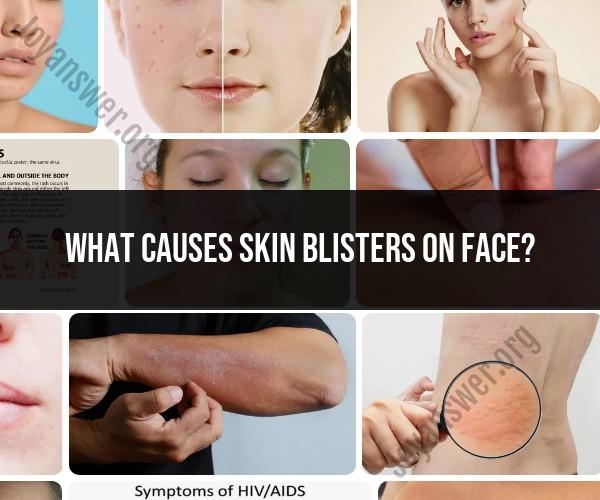What causes skin blisters on face?
Skin blisters on the face can occur for various reasons, and the causes can range from minor irritations to more serious medical conditions. Some common causes of skin blisters on the face include:
Friction or Trauma: Blisters can form when the skin on the face is repeatedly rubbed or exposed to friction. This can happen from activities such as aggressive scrubbing, wearing ill-fitting helmets or face masks, or excessive sunburn. Blisters caused by friction are often referred to as friction blisters.
Burns: Thermal burns from hot objects or liquids, as well as chemical burns from exposure to harsh substances, can lead to blisters on the face.
Infections: Viral or bacterial infections can cause skin blisters. Conditions like herpes simplex (cold sores), impetigo, or shingles (caused by the varicella-zoster virus) can result in blisters on the face.
Allergic Reactions: Allergies to substances like cosmetics, skincare products, or certain medications can lead to skin irritation and blister formation on the face.
Autoimmune Disorders: Some autoimmune skin conditions, such as pemphigus and bullous pemphigoid, can cause blistering of the skin, including the face.
Dermatitis: Contact dermatitis, including irritant contact dermatitis and allergic contact dermatitis, can result in blistering when the skin comes into contact with irritating substances or allergens.
Insect Bites and Stings: Blisters can develop as part of the body's response to insect bites or stings. This can happen on the face if bitten or stung by insects like mosquitoes, bees, or ants.
Medical Treatments: Certain medical treatments, such as laser therapy, chemical peels, or cryotherapy, may cause blisters as a side effect.
Prevention and management of facial skin blisters depend on the underlying cause:
To prevent friction blisters, avoid repetitive rubbing or friction on the skin, use appropriate protective gear, and ensure proper-fitting equipment.
For sunburn-related blisters, protect your face from excessive sun exposure by using sunscreen, sunglasses, and wide-brimmed hats.
In cases of infections, consult a healthcare professional for appropriate treatment, which may include antiviral or antibiotic medications.
Allergic reactions can be prevented by avoiding known allergens and discontinuing the use of products that trigger reactions.
Autoimmune disorders and severe dermatologic conditions require specialized medical attention and treatment.
For burns and other injuries, follow appropriate first aid measures and seek medical care when necessary.
It's essential to consult a healthcare professional if you are uncertain about the cause of your facial skin blisters or if they are painful, recurrent, or associated with other symptoms. Proper diagnosis and treatment are crucial for managing skin conditions and promoting healing.
Understanding the Causes of Skin Blisters on the Face
Skin blisters on the face can be caused by a variety of factors, including:
- Allergies: Allergic reactions to cosmetics, skincare products, jewelry, or other substances can cause blisters on the face.
- Infections: Bacterial, viral, and fungal infections can also cause blisters on the face. Some common examples include chickenpox, cold sores, and impetigo.
- Burns: Thermal burns from hot liquids, steam, or fire can cause blisters on the face. Sunburns can also cause blisters, especially on the nose, ears, and lips.
- Friction: Blisters can form on the face due to friction from clothing, glasses, or other objects.
- Medical conditions: Some medical conditions, such as pemphigus vulgaris and bullous pemphigoid, can also cause blisters on the face.
Allergies, Infections, and Other Triggers of Facial Blisters
Allergies
Allergic reactions to cosmetics, skincare products, jewelry, or other substances can cause blisters on the face. Common allergens include:
- Nickel
- Cobalt
- Fragrances
- Preservatives
- Colorants
Infections
Bacterial, viral, and fungal infections can also cause blisters on the face. Some common examples include:
- Chickenpox: Chickenpox is a viral infection that causes blisters all over the body, including the face.
- Cold sores: Cold sores are caused by the herpes simplex virus type 1 (HSV-1). They appear as blisters on the lips and around the mouth.
- Impetigo: Impetigo is a bacterial infection that causes blisters on the face, arms, and legs.
Other triggers
Other triggers for facial blisters include:
- Burns: Thermal burns from hot liquids, steam, or fire can cause blisters on the face. Sunburns can also cause blisters, especially on the nose, ears, and lips.
- Friction: Blisters can form on the face due to friction from clothing, glasses, or other objects.
- Medical conditions: Some medical conditions, such as pemphigus vulgaris and bullous pemphigoid, can also cause blisters on the face.
Seeking Professional Diagnosis for Facial Skin Conditions
If you have blisters on your face, it is important to see a dermatologist or other healthcare professional to get a diagnosis and treatment plan. The dermatologist will examine your skin and ask about your medical history and symptoms. They may also order tests, such as a skin biopsy, to determine the cause of the blisters.
Treatment for facial blisters will vary depending on the underlying cause. For example, if the blisters are caused by an allergy, the dermatologist may recommend avoiding the allergen and using over-the-counter or prescription antihistamines. If the blisters are caused by an infection, the dermatologist may prescribe antibiotics or antiviral medications.
In some cases, home remedies may help to relieve the symptoms of facial blisters. For example, you can apply a cool compress to the blisters to reduce inflammation and pain. You can also use over-the-counter calamine lotion or hydrocortisone cream to relieve itching.
However, it is important to see a doctor if the blisters are severe, painful, or do not improve with home treatment.












